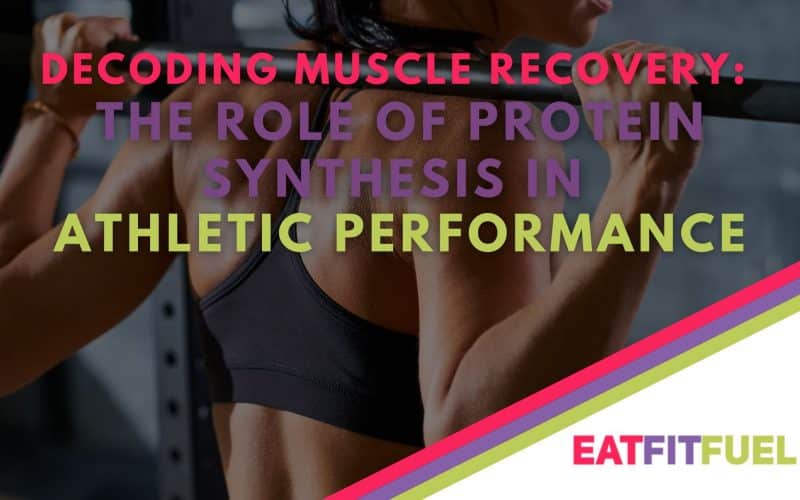Performing at your best as an athlete requires a delicate balance between training hard and having enough recovery time. While rest is important, the body needs more than just time to repair damaged muscle fibers and replenish energy sources. Proper nutrition is just as essential as rest, especially ensuring that you hit your daily proper intake.
Overview:
The Science Behind Protein Synthesis and Muscle Repair
Calculating Optimal Protein Needs for Athletes
Choosing Quality Protein Sources
Animal Proteins
Plant Proteins
Combining Protein and Carbs for Enhanced Recovery
Debunking Myths About Protein and Athletes
Frequently Asked Questions
Conclusion: The Role of Protein in Athletic Performance
The Science Behind Protein Synthesis and Muscle Repair
During intense exercises like weightlifting or sprinting, microscopic tears occur in muscle fibers as they expand and contract forcefully. This muscle damage triggers a sequence of biological processes that stimulate protein synthesis to begin patching up and reinforcing the muscles.
When muscles are exercised strenuously, some of these myofibrils tear apart. The immune system responds by sending neutrophils and macrophages to the site of injury to clear out damaged tissue. This kicks off an inflammatory response that activates satellite cells to multiply and differentiate into new muscle cells to fuse with existing fibers.
This proliferation of muscle proteins to repair exercise-induced damage is how muscles adapt and become stronger over time when paired with proper training. Consuming foods rich in amino acids provides the raw materials to maximize rates of protein synthesis.
If you’re an athlete, microtears happen more often. This muscle damage triggers the body to synthesize new protein strands to patch up and reinforce the muscles. The process of protein synthesis is vital for muscle growth and repair.
The building blocks of protein are amino acids. Our body cannot produce the essential amino acids, so we have to get them from food. Meat, eggs, and dairy have all the nine essential amino acids that are needed for muscle protein synthesis.
Leucine is particularly important. This is a branched-chain amino acid (BCAA), and it directly activates MPS via the mTOR biochemical pathway.
Calculating Optimal Protein Needs for Athletes
Protein needs vary on different factors like weight, age, sex, and level of activeness. If you’re an athlete, the computation for your protein needs is also different because you are more physically active than non-athletes.
Endurance athletes require less protein than strength athletes since their goals emphasize more oxidative muscle fibers than bulk. To compute your protein needs as an athlete, we checked what industry experts have to say.
Two leading experts, the Academy of Nutrition and Dietetics and the American College of Sports Medicine, have summarized the evidence for numerous sports nutrition recommendations.
Current data suggests that, regardless if an individual is a strength or endurance athlete, physically active individuals should consume 1.2-2.0 grams of protein per kilogram of body weight.
The upper end of the recommended protein intake is for individuals who have a higher training frequency and greater intensity. It’s also suggested for periods of calorie restriction to maintain muscle mass.
We also checked what the American College of Sports Medicine recommends. For endurance athletes, it recommends a daily protein intake of 1.2-1.4 grams per kilogram of body weight. For strength and power athletes, it recommends a daily protein intake of 1.6-1.7 grams per kilogram of body weight.
Overall, experts and dieticians recommend a daily protein intake of 1.2-2.0 grams per kilogram of body weight. You can tweak the grams of the proteins you consume depending on your unique needs.
Protein Needs for Strength/Power Athletes Based on Body Weight:
| Body Weight (lbs) | Protein Need (g) |
| 150 | 109-117 |
| 175 | 128-136 |
| 200 | 146-155 |
| 225 | 165-173 |
| 250 | 183-192 |
Spreading your protein intake evenly throughout the day optimizes muscle protein synthesis. If you consume your daily protein needs all at once, it may overwhelm your body.
Choosing Quality Protein Sources
Whole food sources provide superior amino acid profiles compared to processed protein supplements. These foods offer the full spectrum of essential amino acids and other nutrients beneficial for recovery.
Protein shakes are great for supporting gains. However, relying solely on isolates removes the nutrient diversity that is vital for overall health. A mix of whole and supplemental sources is highly recommended by dieticians.
Here are some of the best whole foods that you should consider incorporating into your diet:
Animal Proteins
Beef is a great source of complete protein because it contains all the essential amino acids that your body needs. It’s also rich in iron, zinc, and B vitamins including B12.
A 3 oz serving of lean sirloin contains 25g of protein. If you can, choose beef that is grass-fed for higher omega-3 levels.
Chicken is another great source of protein. Compared to beef, it has lower fat content especially if it’s skinless. It also contains essential nutrients like phosphorus and selenium.
A 3 oz portion of a boneless, skinless chicken breast has 26g of protein. For meal preparation, it’s better to bake or grill chicken instead of frying it to avoid unnecessary oil.
Fatty fish is an ideal source of protein because it is rich in high-quality protein and omega-3 fatty acids, which are good for the heart and the brain. Omega-3s also have anti-inflammatory properties, which is great if you’re training because it reduces muscle soreness.
- Eggs
Eggs are another protein source that contains all of the essential amino acids needed by the body. They are also rich in nutrients like choline and vitamins A, D, and B12. There are many dishes that you can make with eggs.
- Milk
Milk is a good source of protein, specifically casein and whey proteins. These proteins are rich in essential amino acids and are easily digestible. Milk is also a good source of calcium, vitamin D, and other minerals that are important for bone health. This makes it perfect to mix with your protein shake.
An 8 oz glass of milk has 8g of protein. If you’re lactose intolerant, you can try soymilk, almond milk, and oat milk.
- Cottage Cheese
This dairy product has relatively low fat and carbohydrates and high protein. Specifically, it’s rich in casein protein, which provides a sustained release of amino acids. It can help with muscle recovery and maintenance. It’s recommended to be taken before bed to help you recover faster from a hard workout.
- Greek yogurt
This type of yogurt is strained to remove excess whey, making it thicker and protein-rich than regular yogurt. It also has calcium and probiotics, which help promote gut health.
Plant Proteins
- Tofu
Tofu is made from soybeans, so it’s a very good source of plant-based protein. It contains all of the essential amino acids needed by the body. It’s also a good source of iron, calcium, magnesium, and other minerals. It’s low in saturated fat and can be used in many dishes.
A 5 oz serving of tofu has 10g of protein. It is best to go for organic and non-GMO varieties.
- Edamame
These are young, green soybeans that haven’t fully matured yet. They are rich in protein, dietary fiber, and various vitamins and minerals like folate, vitamin K, and manganese. With a half cup of edamame, you get 11g of protein. There are lots of ways to prepare edamame, but the easiest is to boil or steam them.
- Lentils
These are legumes that are high in protein, dietary fiber, and complex carbohydrates. They are a very good source of folate, iron, potassium, and various B vitamins. They are also known for their low glycemic index, which is great for diabetics because they have a slow and steady impact on blood sugar levels.
A half cup of lentils provides 9g of protein. Lentils are a great vegetable to add to soups, salads, and other rice dishes.
- Chickpeas
Also known as garbanzo beans, chickpeas are one of the all-time vegetarian favorites. This legume is rich in protein, dietary fiber, and complex carbohydrates. They provide essential nutrients such as iron folate, phosphorus, and B vitamins.
A half cup of chickpeas is about 5g of protein. You can eat them on their own, but you can also add them to salads, stews, hummus, and many more.
Nuts and nut butter
These are excellent sources of plant-based protein, healthy fats, and various vitamins and minerals. They are also rich in antioxidants, fiber, and heart-healthy monosaturated fats. They’re great as snacks, but they can also be used in cooking.
Combining Protein and Carbs for Enhanced Recovery
Taking protein with carbohydrates can further increase protein synthesis and glycogen replenishment after exercise. Whole food sources like chocolate milk, fruit, yogurt, or turkey sandwiches automatically provide this protein and carb pairing.
Fast-digesting carbs from fruits, grains, and dairy should be consumed within the 60-minute “anabolic window.” This expedites the transport of amino acids and glucose into muscle cells when they need it the most. This fuels the repair and recovery process.
Debunking Myths About Protein and Athletes
Protein has lots of benefits for the body, but there are still some persistent myths around it that need debunking. Here are a few popular myths that surround protein consumption:
Myth: More protein equals more muscle.
Fact: Muscle growth is influenced by various factors including genetics, exercise, overall diet, and recovery. Protein plays a big role in this, but consuming more protein than what your body needs won’t result in larger muscles. Excess protein only gets stored as fat in the body or gets excreted as waste.
Myth: Plant protein is inferior.
Fact: Some plant-based protein sources may indeed lack certain amino acids, but this does not make them inferior. You can get all the necessary amino acids from a variety of plant foods. Many plant-based protein sources also contain valuable fiber, antioxidants, and other nutrients that contribute to overall health.
Myth: Protein from animal sources causes cancer.
Fact: The link between protein from animal sources and cancer is not as straightforward as the myth suggests. Some studies show an association between high intake of red and processed meats and certain types of cancer. But considering the context is important!
The potential risk is more associated with factors like cooking methods, the presence of compounds formed during cooking, and other dietary habits associated with red and processed meat consumption.
However, not all animal sources of protein have been definitively linked to cancer. Lean and minimally-processed animal protein can still be a part of a balanced diet. What’s important is to observe moderation and variety.
Frequently Asked Questions
What if I’m a vegetarian/vegan athlete?
Combine plant-based proteins like beans, lentils, tofu, and seitan to get all the essential amino acids. Supplement this with soy/pea protein powder as needed.
Are protein shakes enough for muscle recovery?
While convenient, rely more heavily on nutrient-rich foods. Use shakes for pre-/post-workout bursts around whole-food meals.
How much protein should I eat if I am injured?
Increase your protein intake by up to 20% of the normal intake to provide amino acids for tissue repair. Reduce your activities instead of overeating protein.
Conclusion: The Role of Protein in Athletic Performance
Science and real-world results agree that proper protein intake is crucial for muscle recovery and athletic adaptation. Carefully-timed consumption of high-quality protein sources makes the difference between average and elite-level performance. Whether just starting or training for championships, be sure to make protein a priority and decode the optimal recipe for your body to thrive.






